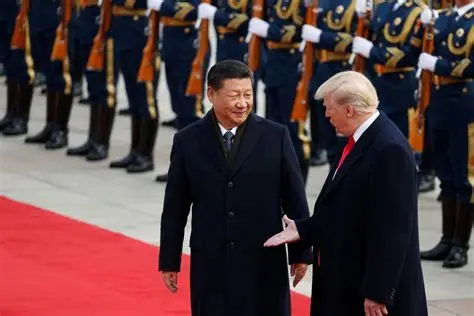The United States and China have agreed a framework for a trade deal just days before President Donald Trump and Chinese President Xi Jinping are due to meet in South Korea, easing fears of a renewed escalation in global trade tensions.
The agreement was forged on the sidelines of the Association of South-East Asian Nations (ASEAN) summit in Malaysia on Sunday, where US Treasury Secretary Scott Bessent confirmed that the deal would remove the immediate threat of 100 per cent tariffs on Chinese imports due to take effect on 1 November. It will also include provisions for a final settlement on the sale of TikTok in the United States.
Trump arrived in Malaysia on Sunday at the start of a five-day tour of Asia, which will culminate in a face-to-face meeting with Xi on Thursday. Speaking after the talks, the US president struck an optimistic note, declaring: “I think we’re going to have a deal with China.”
As part of the truce, China has agreed to delay for one year the imposition of export controls on minerals critical to the production of fighter jets, smartphones and electric vehicles. These rare earth elements, over which Beijing holds a dominant position in global supply and refining, had become a central point of contention in the dispute.
China’s chief trade negotiator, Li Chenggang, described the outcome as a “preliminary consensus”, adding that both sides would now proceed through their respective internal approval processes. “The US position has been tough,” Li said. “We have experienced very intense consultations and engaged in constructive exchanges in exploring solutions and arrangements to address these concerns.”
The breakthrough comes after months of heightened tensions between the world’s two largest economies. The dispute was triggered in April when Trump announced sweeping tariffs in what he termed a “liberation day” for American industry.
In response, Beijing imposed restrictions on exports of rare earths and halted purchases of US soya beans, a move that struck at the heart of America’s agricultural sector.
Trump accused China of attempting to hold the world “captive” by leveraging its control of rare earths, which account for 60 per cent of global production and 90 per cent of refining capacity.
Impact on Agriculture
The agreement is expected to bring relief to US farmers, particularly in the soya bean sector. China is the largest customer for American soya beans, traditionally importing around half of the country’s $24 billion annual exports. Purchases had been suspended in September, with China sourcing supplies from Brazil and Argentina instead.
Bessent told reporters that he anticipated the tariff truce would be extended beyond its current expiry date of 1 November, and that China would resume substantial purchases of US soya beans. “US soya bean farmers will feel very good about what’s going on both for this season and the coming seasons for several years,” he said.
US Trade Representative Jamieson Greer added that both sides had agreed to pause punitive measures and had identified “a path forward where we can have more access to rare earths from China, we can try to balance out our trade deficit with sales from the United States.”
Wider Global Implications
The prospect of a deal between Washington and Beijing has eased fears of a wider trade war that threatened to disrupt car production across Europe and the United Kingdom. Analysts had warned that escalating tariffs and restrictions could have had severe consequences for global supply chains.
Meanwhile, Trump also held talks with Brazilian President Luiz Inácio Lula da Silva in Malaysia, raising hopes of a thaw in relations between the two countries. Lula described the meeting as “positive” and said their teams would begin immediate discussions on tariffs and other disputes.
Relations between Washington and Brasília have been strained since August, when Trump raised tariffs on most Brazilian imports from 10 per cent to 50 per cent. Lula said the two sides had agreed to seek solutions to the tariffs and sanctions imposed on Brazilian authorities.
Trump had previously linked the tariff increases to what he described as a “witch-hunt” against former Brazilian president Jair Bolsonaro.



